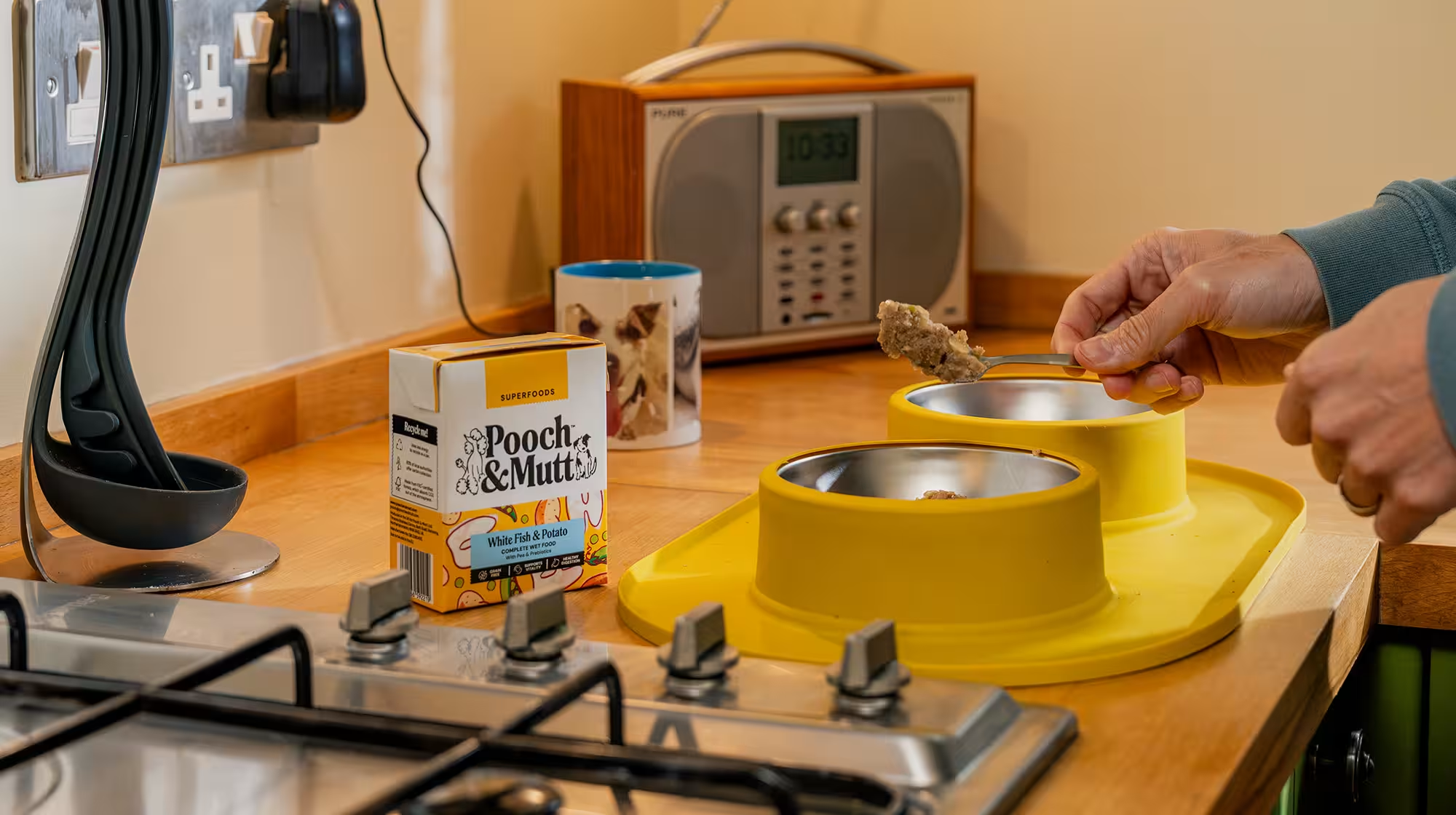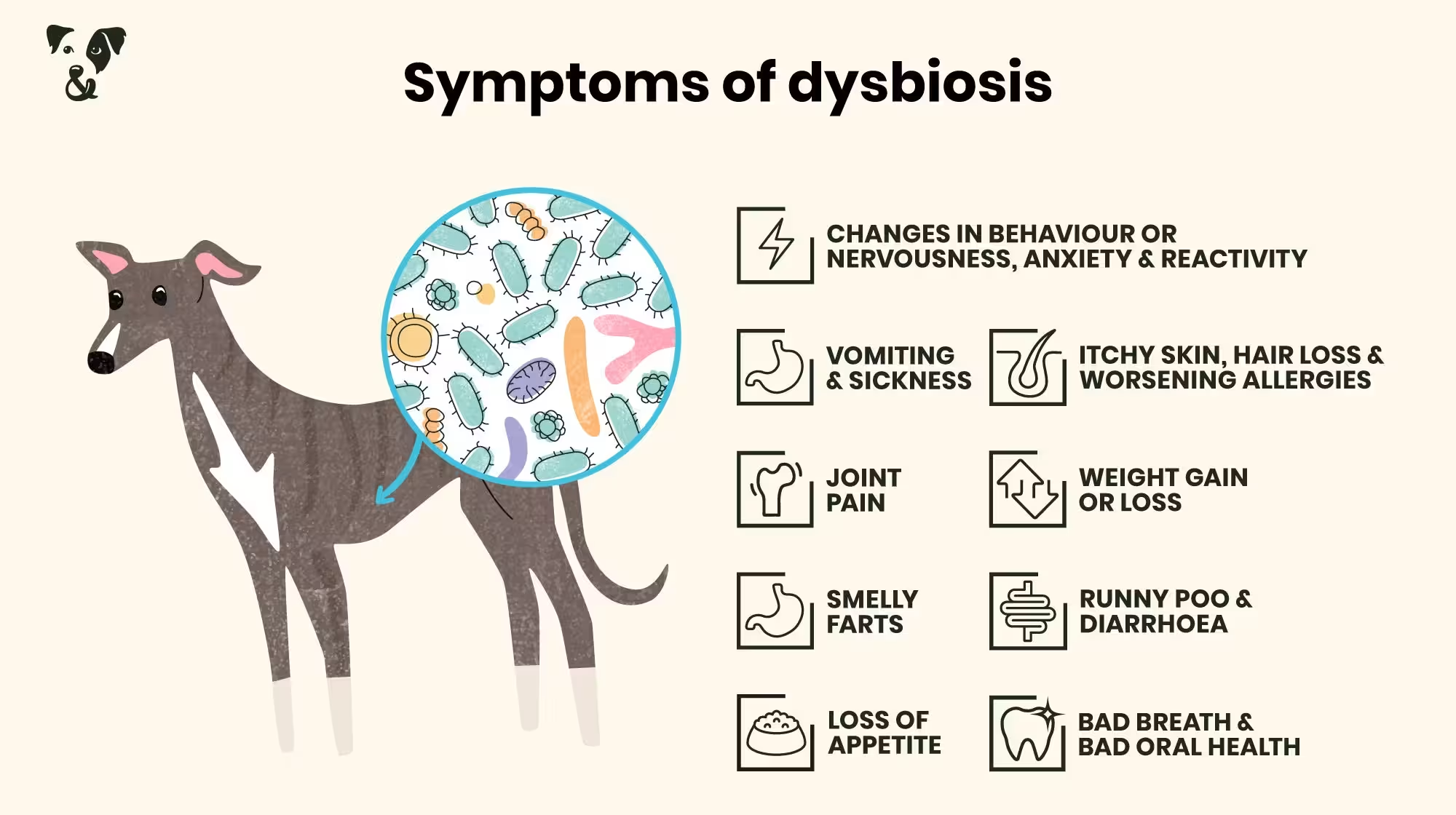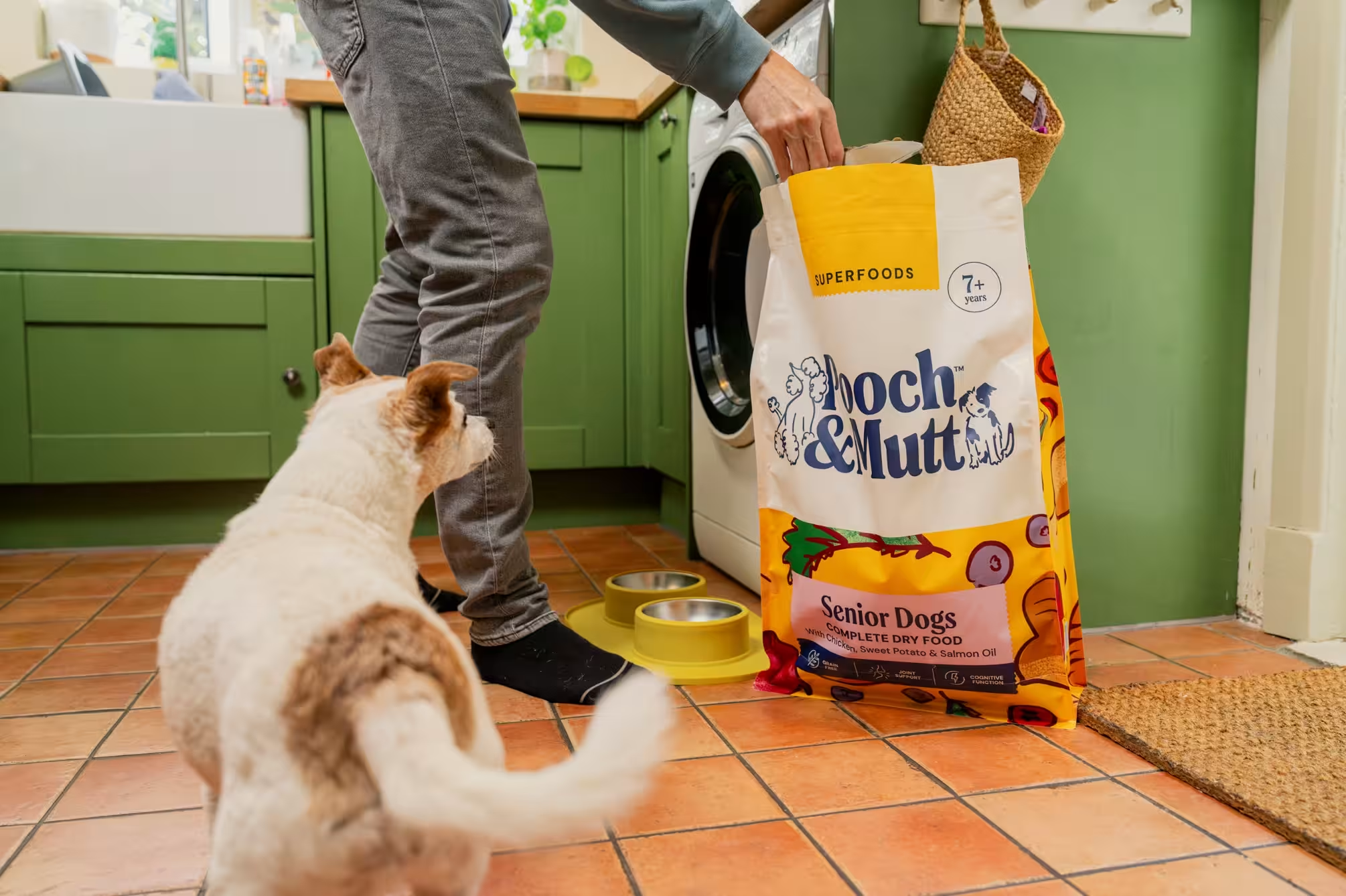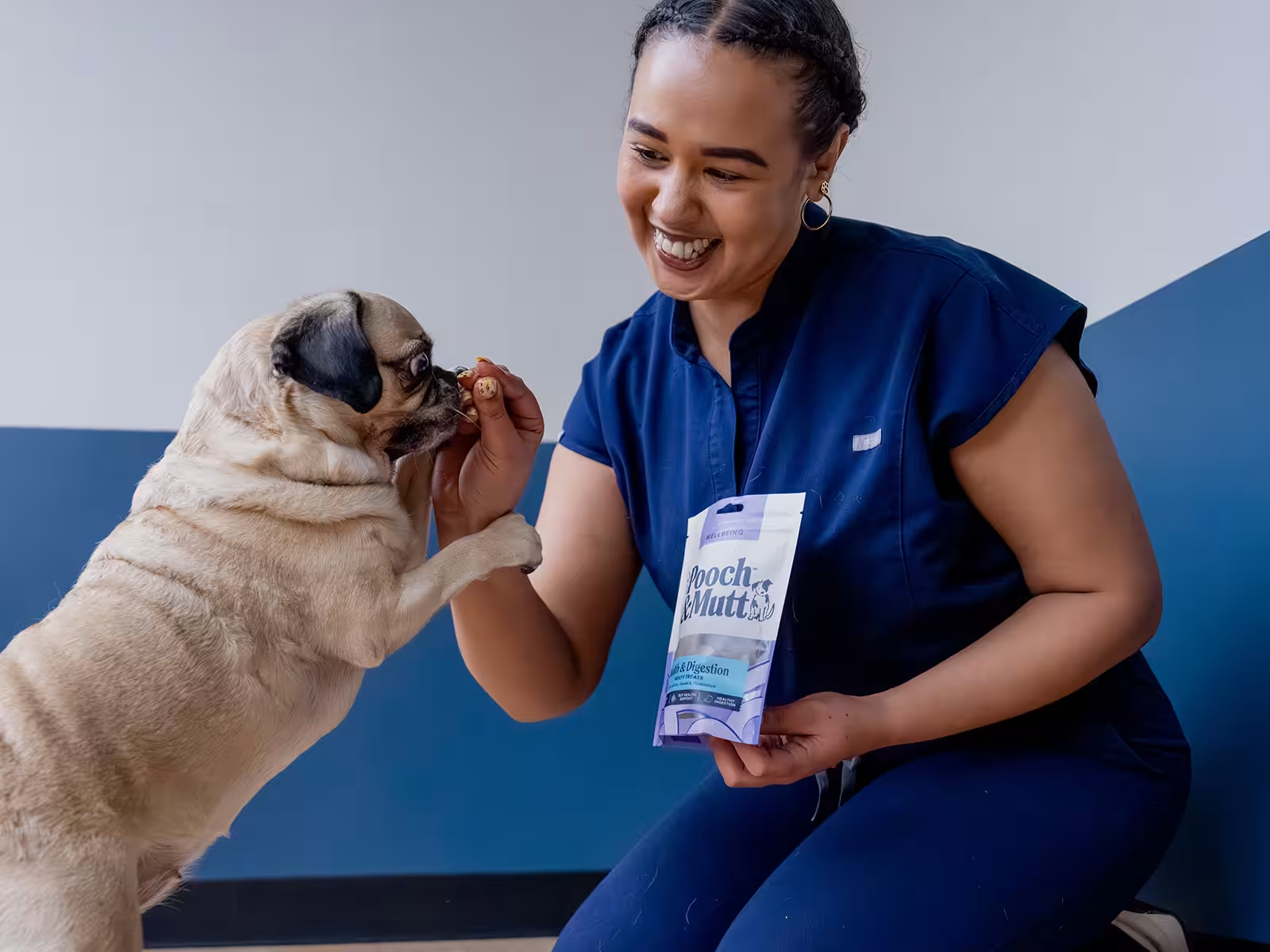Key Takeaways:
- A balanced diet is crucial for a dog, and by balanced we mean dog food that contains everything they need to live and support their bodies.
- Your dog’s diet, their gut health, and their gut microbiome are intrinsically linked. Having the right balance of bacteria within the microbiome allows your dog's body to efficiently absorb all the goodness from food, so their body can benefit from the nutrients, vitamins and minerals.
- If your dog is suffering from dysbiosis, or an imbalance of bacteria in the gut microbiome, you won't be able to see the benefits of their diet or any added supplements.
Your dog’s diet is what gives them the energy to run, play fetch, and live their best life!
But did you know, it also plays a huge role in the health of their gut, as well as the strength and function of their gut microbiome?
Alongside being crucial to great gut and microbial health, it could also be a contributing factor towards microbial imbalance, and all the symptoms that come along with it.
With your dog’s diet AND gut microbiome being a key supporting factor to great gut health and their overall health and wellbeing, it’s important that, as dog owners, we understand exactly how important it is to get it right.
Read on to explore how your dog’s diet, their microbiome, and overall gut health are all linked, and how you can make sure your dog is getting the most out of their diet.
Why is a dog’s diet so important?
Just like in humans, diet plays a huge role in keeping your dog happy, healthy, and thriving!
What a healthy, balanced diet looks like will differ for each dog. Finding the right food that fits their needs will help support your dog’s body, help them combat various health conditions, and give them the energy to go about life.

What do we mean by a balanced diet?
When we talk about a balanced diet for our dogs, we're talking about dog food that contains everything they need to live and support their bodies. This includes the right amount of vitamins, minerals, fats, carbohydrates, proteins, fibres and all the good stuff that keeps everything ticking. When shopping around for dog food, you’ll often find this described as ‘complete dog food’ on packaging. Meeting the needs of your dog through diet will look different depending on their age, breed, and lifestyle. For example, for a puppy , their diet should be there to support their growth and development. For a senior, we want to focus more on supporting their needs and any health conditions that may come with age.
Of course, diet and food are a key component to your dog’s digestive system, as this is how your dog absorbs and utilises all those nutrients. And all of these processes happen thanks to the gut microbiome.
What do we mean by the gut microbiome?
The gut microbiome is a microscopic ecosystem made up predominantly of bacteria, that sits within your dog’s gut. The gut microbiome is the powerhouse of your dog’s body, with the microbiota (the group of microorganisms that live within it) playing a crucial role in supporting the strength and function of most of your dog’s bodily processes. Many of which keep them happy, healthy, alive and thriving! We know it's directly linked to digestion, but it also supports:
Their immune system
Nutrient absorption and metabolic health
Their overall gut health
Brain function and behaviour
Skin and coat health
Cardiovascular health
The gut microbiome can only ensure the smooth running of these processes when the bacteria that live within it are diverse, rich and balanced. This means the species and genus groups are varied, but are in equal proportion to each other. When things aren’t balanced, these processes can’t function properly and can result in detrimental symptoms.

An imbalance of the gut microbiome is referred to as dysbiosis and can result in the following symptoms:
Varying stool consistency and blood in stools
Foul-smelling farts
Bad breath
Hair loss and skin irritation
Stress, anxiety and issues with behaviour
Lack of appetite, weight gain or weight loss
How does your dog’s diet impact their gut microbiome?
Your dog’s diet, their gut health, and their gut microbiome are intrinsically linked.
What you feed your dog, or sometimes what they accidentally eat, can impact their microbiome in more ways than one. But how?
Their type of diet
Whether you choose to feed your dog fresh food, raw or kibble, any one will impact their microbial diversity.
There’s a lot of discourse out there regarding what diet is best for dogs. But the truth is, it all comes down to the dog and their specific needs. With the gut microbiome having so many impacting factors like age, breed and medical history, the approach for a healthy gut microbiome and optimal gut health will look different for each dog. As will their diet! One dog, in alignment with their breed, genetics or lifestyle, may benefit more from a protein-rich diet, so would be better on raw. Another may need more fibre, where a kibble or fresh diet would be the best option. Either way, the type of food they eat will directly impact their microbial diversity, and should always be taken into account when investigating their gut health.
Resident Head of Microbiology, Dr Bushra Schuitemaker states:
“Recent studies have shown that when looking into these diets in more detail, overall, kibble was found to provide the most stable gut microbiome. This has made it an important feature in the diets of dogs suffering from certain illnesses like epilepsy, and a really helpful addition for dogs that have quite sensitive and delicate tummies.”
What they accidentally eat
As dog owners, we can focus our energy on creating the best diet for our dogs. But with most dogs not being too fussy with what goes in their mouth, it’s common that they chomp down on things they shouldn’t. If your dog’s prone to eating out of the bin, poop whilst on walks, or even food your children drop from their high chair, this will also have an effect on their gut microbiome, and consequently their gut health. Eating or having exposure to things that aren’t typical in a dog's diet is going to have an impact on the levels of bacteria that live within their gut microbiome. This could be anything from animal poo to human food that’s full of salt and saturated fat. This is due to adding different levels of bacteria to the microbiota, which can lead to reduced diversity, weakened gut wall permeability, and inflammation.
Dietary changes
When your dog’s experiencing symptoms associated with bad gut health, like runny poos, foul-smelly flatulence, and a lack of appetite, the most common call to action is to assess and adapt their diet. When perfecting your dog’s gut health, dietary adaptations are the first port of call, but when it’s based on guesswork, we can sometimes be doing more harm than good. Especially if going through a trial-and-error period.
Changing our dog’s diet should always be done gradually to avoid further upset for the gut. This is why you’ll find our tailored Gut Supplement plans always span over 6 months to make a big, long-lasting impact in the least intrusive way. When it comes to their diet, making quick, drastic changes does impact their gut microbiome. This usually does balance out over time, but their gut has to be in tip-top shape to bounce back when changing their food.
The resilience of their gut is crucial in helping your dog acclimate to their new diet. If they don’t have the right microbial diversity to do so, or their diet isn’t serving their needs, this can lead to more gut upset.
This is what makes gut health intervention so key in perfecting your dog’s diet.

Diversity and balance
Whilst diet can be an impactful factor in the balance of their gut microbiome and their overall gut health, it's also crucial to the strength of their gut microbiome, and in the treatment of dysbiosis.
When eating a well-balanced diet, especially one designed for your dog’s needs, it can provide probiotics that add live cultures to their gut microbiota, and maintain diversity and balance.
Probiotics can be included in your dog’s diet via natural ingredients , or through selected gut health supplements.
Feeding the bacteria
Diet doesn’t only add beneficial bacteria to your dog’s microbiota, but also feeds the beneficial bacteria, helping them to thrive. Diet and additional supplements can add bacteria-feeding prebiotics into your dog’s diet, boosting their gut health and consequently, their overall health and wellbeing. Not only this, natural vitamins and minerals from diet further support the health of their gut microbiome.
To learn about what bacteria is living in your dog's gut, explore our article: ' Dog owners: What you need to know about your dog’s gut microbiome '.
I feed my dog the best diet and supplements - why aren’t they working?
One of the first things we’re told as dog owners is to get their diet right. As we’ve seen, not only is it crucial for them to have the energy they need to live their best life, but also to feel their best too! But sometimes, even when you feel like your dog has the best possible diet, you might not see the benefits.

Whilst this can feel very frustrating, and even urge you to go back to the drawing board, it could be your dog’s gut and their microbial diversity to blame, and not the food itself! Not to mention, both our dogs and their gut microbiomes change over time. This means, depending on their age or stage of life, they’ll need different kinds of support, whether that’s through diet, supplements or lifestyle changes. Investigating your dog’s gut health helps narrow this down and guides their treatment in the right direction.
As we previously discussed, the gut microbiome is a huge contributor to the strength, support and function of many of your dog’s main bodily processes, including digestion. This includes the breakdown of food, and the absorption of nutrients, vitamins and minerals.
So, when there’s a bacterial imbalance and their microbial health isn’t where it should be, their body isn’t able to soak in all that goodness that comes from natural ingredients, supplements and other dietary add-ons. This means they’ll miss out on all the goodness their diet, and additional supplements should be bringing.
This is why, here at Pooch & Mutt, we encourage all dog owners to investigate their dog’s gut health so they can get the utmost out of their diet and added supplements.
So, how do I know what food and supplements are best for my dog?
The very first step in your dog’s gut health journey, to find out exactly what they need in their diet to benefit them most, is a Gut Health Test . And this is where Pooch & Mutt can help!
A Pooch & Mutt Gut Health Test starts with us sending you everything you need to collect a poop sample from your dog, complete your Activation Quiz, and post it to our lab.


Gut Health Test
Get your results in 4 weeks, with our quick and easy, at-home Gut Health Test for dogs. One simple poo sample, analysed by our microbiologists, and you’ll get personalised recommendations to help your dog thrive.
*This item is excluded from all discount codes.
-
Science backed gut health insights
-
Online report including key health indicators
-
81% saw an improvement in their dog's health
Current price: £69.99
Gut Health Test
Then, considering your pooch’s age, breed, medical history, environment and lifestyle, we can gain a representative insight into the bacteria living inside their gut microbiome, and how it impacts their overall health. Using these results, we can calculate a completely tailored diet and a scientifically proven, 3-stage supplement plan . Thus, helping you to cut out all the guesswork when it comes to their diet and ensure your dog’s getting everything they need.
The tailored Gut Health Supplement plan is available via a bi-monthly subscription or a one-off purchase. Split into 3 phases, it aims to Restore, Repopulate and Optimise your dog’s gut microbiome and encourage balance and an alleviation of pesky symptoms.
To learn more about our the power of our Supplement Plans, check out our article ' Your dog's Gut Health Supplement Plan explained '.
As you can see, your dog’s gut microbiome plays a critical role in their overall health and wellbeing. A Gut Health Test is the natural first step towards their journey in achieving optimal health. Explore more about gut health testing and the gut microbiome , and if you have any questions, be sure to reach out to our expert team at pooch@poochandmutt.com.



